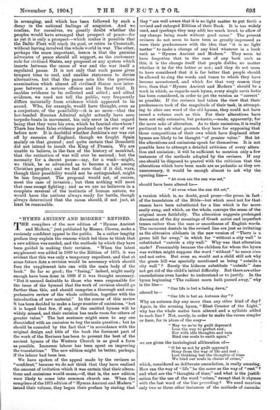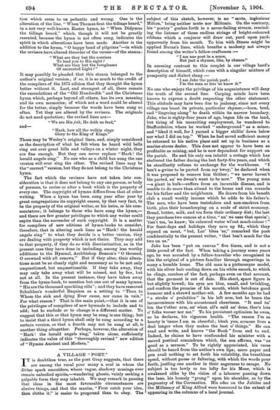T HE compilers of the new edition of "Hymns Ancient and
Modern," just published by Messrs. Clowes, make a curiously confident appeal to the public. In a rather lengthy preface they explain the reasons which led them to think that a new edition was needed, and the methods by which they have been guided in making their revision. "When the latest supplement was added in 1889 to the Edition of 1875, it was evident that this was only a temporary expedient, and that at some future date a revision would be necessary which should fuse the supplement into one with the main body of the book." So far so good ; the "fusing," indeed, might easily enough have been done in 1889 if it was thought necessary. "But it seemed desirable to those who were responsible for the issue of the hymnal that the work of revision should go further than this, and should comprise a thorough and com- prehensive review of the whole collection, together with the introduction of new material." In the course of this review it has been decided to make a large number of omissions, "but it is hoped that few, if any, of the omitted hymns will be widely missed, and their excision has made room for others of greater value." The last sentence might seem to any one dissatisfied with an omission to beg the main question ; but he should be consoled by the fact that "in accordance with the original design and title of the book the foremost part of the work of the Revisers has been to present the best of the ancient hymns of the Western Church in as good a form as possible. Immense labour has been spent on improving the translations." The new edition might be better, perhaps, if the labour had been less.
We have spoken of the appeal made by the revisers as "confident," because we do not think that they have realised the amount of irritation which it was certain that their altera- tions and omissions would cause,—if, that is, the new edition were likely to come into common church use. When the compilers of the 1875 edition of "Hymns Ancient and Modern" issued their volume, they began their preface by stating that used, and (perhaps they may add) too much loved, to allow of any change being made without good cause." The present revisers do not seem to have been so greatly impressed as were their predecessors with the idea that "it is no light matter" to make a change of any kind whatever in a book such as "Hymns Ancient and Modern." They seem to have forgotten that in the case of any book such as this, it is the change itself that people dislike, no matter whether it be for the better or not ; and they do not seem to have considered that it is far better that people should. be allowed to sing the words and tunes to which they have' become accustomed, and which for that very reason they love, than that "Hymns Ancient and Modern's should be a work in which, as regards each hymn, every single roaria lectio has been considered, in order to get the version as "correct' as possible. If the revisers had taken the view that their predecessors took of the magnitude of their task, in attempt- ing to alter one word of the old hymns, they acould not hate issued a volume such as this. For their alterations have been not only extensive, but pedantic,—made, apparently, for the mere sake of alteration. As to their omissions, it is really pertinent to ask what grounds they have for supposing that those compositions of their own which have displaced other hymns are likely to be thought "of greater value." But let the alterations and omissions speak for themselves. It is not
possible here to attempt a detailed criticism of every alters tion and omission; it will be sufficient to mention only a few
instances of the methods adopted by the revisers. If any one should be disposed to quarrel with the criticism that the alterations which have been made are as pedantic, as they are unnecessary, it would be enough almost to ask why the
opening line—
"At even ere the sun was set,"
should have been altered to—
"At even when the sun did set", a version which is, no doubt, good prose—the prose, in. fact of the translators of the Bible—but which need not for that reason have been substituted for a line which is far more , easily sung, and which, on the whole, conveys the sense of the original more faithfully. The alteration suggests prolonged: discussion of the dry meanings of Greek aorist and imperfect ; tenses rather than the ease or smoothness of English words. The recurrent dentals in the revised line are just as irritating as the obtrusive sibilants in the new version of "There is a green hill far away," in which for "without a city wall" is substituted "outside a city wall." Why was that alteration made P Presumably because the children for whom the hymn was written might suppose the word " without " to mean sine, and not extra. But even so, would not a child still ask why the green hill was specially mentioned as being "outside a city wall" ? Surely the hideous substitute " outside " does not get rid of the child's initial difficulty. But there are other- emendations even harder to understand or to justify. In the: hymn beginning "The radiant morn hath passed aWay," why
is the line— "Our life is but a fading dawn," altered to—
"Our life is but an Autumn day" ?
Why an autumn day any more than any other kind of day P. Again, in the evening hymn, "Blest Creator of the Light,"' why has the whole metre been altered and a syllable added to each line ? Not, surely, in order to make the verses simpler'
or finer, for in place of the easy-
" May we ne'er by guilt depress'd Lose the way to perfect rest; Nor with idle thoughts and vain Bind our souls to earth again,"
we are given the tautological alliteration of- " 0 let us not by guilt oppresed
Stray from the way of life and rest ; Lest thinking but the thoughts of time We bind our souls in chains of crime," which, considered as deliberate emendation, is really amazing. How can the way of " life " be the same as the way of "reek"? and what are the "thoughts of time," and what is the justifi- cation for the use of the word "crime," except that it rhymes with the last word of the line preceding ? We need mention
only two or three other instances of the methods of emends.' in a not very well-known Easter hymn, to "When Didymus the tidings heard," which, though it will not be greatly resented, because the hymn is not often sung, indicates the spirit in which alterations have been made. Another is the addition to the hymn, "0 happy band of pilgrims "—in which the revisers have altered theorder of the verses—of the stanza: "What are they but the couriers To lead you to His sight ?
What are they but the foregleams Of uncreated Light?"
It may possibly be pleaded that this stanza belonged to the author's original version ; if so, it is so much to the credit of the compilers of the 1875 edition that they thought the hymn better without it. Last, and strangest of all, there remain
the emendations of the "Old Hundredth " and the Christmas hymn which, perhaps beyond all others, has its own meaning and its own memories ; of which not a word could be altered for the better, simply because the words have been sung so often. Yet they are altered by the revisers. The originals do not need quotation; the revised lines are— "We are His folk, He doth us feed," "Hark, how all the welkin rings Glory to the King of Kings."
Those may be Wesley's original lines, and, simply considered as the description of what he felt when he heard wild bells ring out over great hills and valleys on a winter night, they are fine enough. But they can never replace "Hark ! the herald angels sing." No one who as a child has sung the one version will ever sing the other. The revised lines may be the" correct" version, but they do not belong to the Christmas hymn.
The fact which the revisers have not taken into con- sideration is that it does not belong to any one person, or body of persons, to revise or alter a book which is the property of every one. The copyright of hymns differs from that of other
writing. When a hymn has been sung year after year by great congregations its copyright ceases, by that very fact, to be the property of the original writer, or his heirs, or his com- mentators; it belongs to those who have sung the hymn,— and there are few greater privileges to which any writer could aspire than the surrender of such copyright. It is a matter for compilers of new editions of hymn-books to consider, therefore, that in altering such lines as " Hark ! the herald angels sing" to what they decide is a better version, they are dealing with property which is not theirs. They may add to that property, if they do so with discrimination, as in the present case they have done in including, among less worthy additions to the Hymnal, Archbishop Benson's "0 throned, 0 crowned with all renown." But if they alter, their altera- tions must be so clearly right and necessary as to be not only unquestioned, but unquestionable. If they take away, they may only take away what will be missed, not by few, but not at all. In the present instance, they have taken away from the hymn-book, to mention but one out of many hymns, "His are the thousand sparkling rills"; and they have removed Schulthes's wonderful Requiem as a setting to "Thou to Whom the sick and dying Ever came, nor came in vain." For what reason ? That is the main point,—that it is one of the privileges of compilers of new hymnals to include and to add; but to exclude or to change is a different matter. To suggest that this or that hymn may be sung is one thing; but to insist that a third hymn shall only be sung according to a certain version, or that a fourth may not be sung at all, is another thing altogether. Perhaps, however, the alteration of "Hark ! the herald angels sing," taken alone, sufficiently indicates the value of this "thoroughly revised" new edition of "Hymns Ancient and Modern."
A VILLAGE "POET."
TT is doubtless true, as the poet Gray suggests, that there



























































 Previous page
Previous page